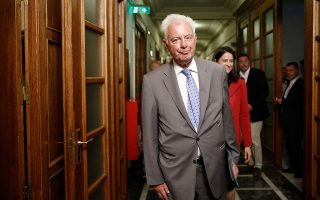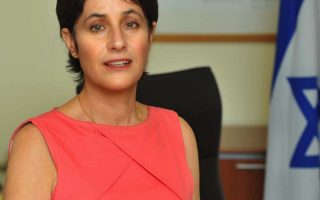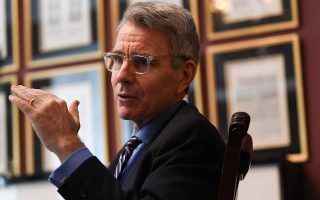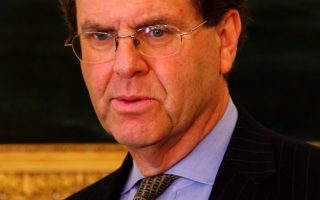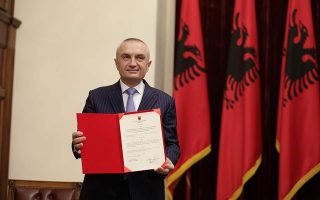Koumoutsakos to Kathimerini: Worrying increase of migrant flows in the Aegean
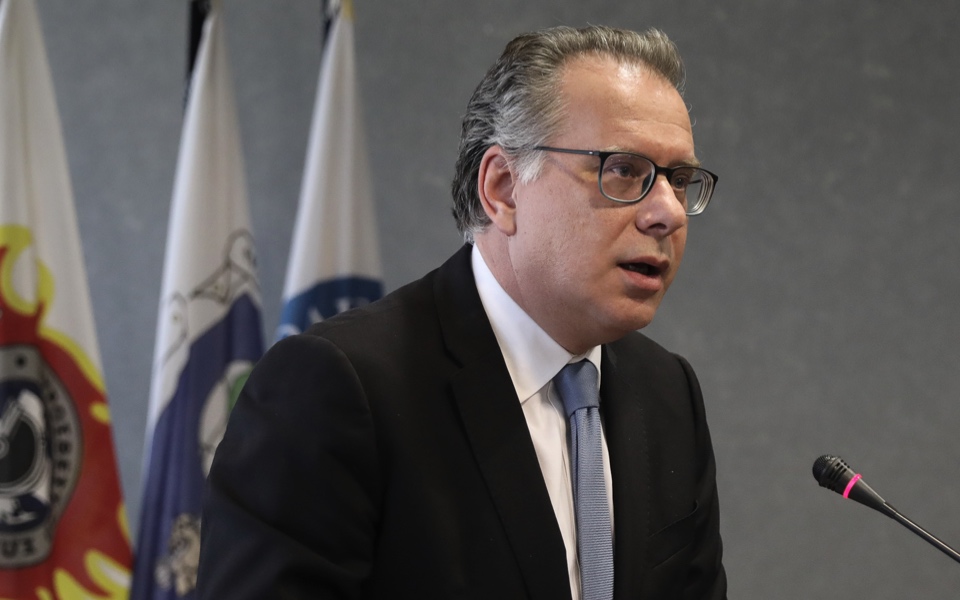
The Greek government is deeply concerned over the reported 17 percent increase in migrant and refugee arrivals in recent weeks, says Alternate Minister for Citizens’ Protection Giorgos Koumoutsakos, who is responsible for Greece’s migration policy, in an interview with Kathimerini. More than 20,000 people are currently stranded on the Greek islands of Lesvos, Samos, Chios, Kos and Leros.
Koumoutsakos says that the new government inherited a “closed” system of constant inflows and very limited outflows. He speaks of a nascent migration corridor between Alexandroupoli and Samothraki in northeast Greece, and warns of the additional strain on an already tense situation caused by overcrowding on island as well as mainland facilities.
The conservative minister also stresses that recent threats from Turkish officials combined with tension in Ankara’s ties with Brussels and Washington are a cause for serious concern. At the same time he recognizes that Turkey has shouldered a significant burden, and through that prism he notes that Athens wants to cooperate on the issue with its neighbor to the East.
You have just visited Mytilene. What is the situation regarding the flows from Turkey toward the islands?
The situation we inherited was particularly difficult right from the beginning: overcrowding in the existing five hotspots on the islands, a situation where 25 structures on the mainland have reached the limits of their capacities, inadequate infrastructure and insufficient personnel, especially lengthy procedures when it comes to the review of asylum applications, and as a consequence of all of the above, an increasing strain on local communities. In a nutshell, a combination of complex problems that no longer have easy solutions.
I traveled to Lesvos because the messages we received are worrying, and this despite the fact that, as Citizens’ Protection Minister Michalis Chrysochoidis has stressed, the relevant authorities and their personnel are carrying out their duties under very difficult conditions, thus ensuring the proper functioning of the local economy and social calm on the island. Increased flows are being observed, which in turn generate even more pressure on an already asphyxiating situation at the Migrant Reception and Identification Center in Moria. There has been an intensification of migrant and refugee flows during 2019, and in particular over the past few months.
Today on the five Aegean islands, that is Lesvos, Samos, Chios, Kos and Leros, the total number of refugees and migrants has exceeded 20,000. This constitutes an increase of 17 percent in a few weeks. This increase has occurred while the pace of flows has increased substantially. Since July 7, there has not been a single day without arrivals. Indicatively, on Lesvos, we have had an increase of 44 percent compared to the same period last year. August 9 was one of the worst days during the summer period for Lesvos, as six boats with 250 people arrived.
It is not just the numbers. It is also the geographic dissemination. The networks of the migrant smugglers are seeking to spread the flows to more Aegean islands. Thus, the geographic scope of remedial actions is also expanding. Over the past few months, a new “corridor” has been created between Alexandroupoli and the island of Samothraki. An additional reason for further reflection is the geopolitical overheating in the broader region, which could lead to a new increase in the flows. All of the above confirm the fact that the situation is very complicated and multifaceted. The issue of migratory and refugee flows is a very difficult equation.
Regarding the migration issue, in the recent past we have heard threatening statements by President Recep Tayyip Erdogan, as well as other high-level Turkish officials addressed to Europe.
There is no need to overdramatize these statements. Similar statements have been made in the past. But they cannot be ignored. The intensity in style and content, and particularly their recent frequency, at a juncture when relations between Ankara on the one hand and Brussels and Washington DC on the other are another factor that needs to be taken into account.
Cooperation on the migration issue with Turkey, a country that has genuinely taken a heavy burden when it comes to the effects of the refugee crisis, is of special importance for both countries. This is the reason why one of the first meetings I had, immediately after assuming my functions, was with the Turkish Ambassador in Athens Burak Ozugergin. After all, I happen to know him from the time when we were both spokespersons of our respective countries’ foreign affairs ministries. During our meeting, I informed him of our willingness for constructive cooperation in the framework of the European Union-Turkey Statement on the migration-refugee issue. A cooperation that should be decoupled from the existing difficulties in the context of bilateral relations between our two countries.
Where does the implementation of the EU-Turkey Statement stand when it comes to the returns of illegal migrants?
Undoubtedly, this statement has had a relieving effect. However, it can and must perform much more effectively. Unfortunately, the previous government had a low performance, when it comes to the issue of returns, and, respectively, Turkey is not succeeding in the necessary eradication of the smugglers’ networks, and is not as effective in the strict surveillance of its coasts. Another issue that we have to address is Turkey’s refusal to accept the return of people from the Greek mainland, but who have entered Greece via the islands, a situation to which, unfortunately, the previous government contributed by adopting an unjustifiably passive stance.
I believe that all these issues can be better addressed through hard work, mutual understanding and good will. Dealing effectively with the migration-refugee issue is in the interest of both Greece and Turkey. The successful implementation of the EU-Turkey Statement is a challenge and a gamble also for Europe, since it was agreed by the heads of state and government of the EU member-states. I also stressed these points to the foreign policy adviser of Chancellor Angela Merkel, Jan Hecker, whom I met recently, in view of Prime Minister Kyriakos Mitsotakis’ visit to Berlin, during which migration will be one of the core issues to be addressed.
What about cooperation with the EU and the intentions of the new president of the European Commission, Ursula von der Leyen?
Cooperation with the European Commission is fundamental when it comes to addressing the refugee issue more effectively. In previous years, actions undertaken by the relevant commissioners, Dimitris Avramopoulos and Christos Stylianides, have helped in achieving this result. Now, we have to cooperate with a new Commission. We do not know who will assume these “portfolios” which are critical for Greece. Greece, being a front-line country, a country which also serves as part of EU’s external border, which has exhausted its capacity on this issue, is looking forward to efficient cooperation with the European Commission and the member-states.
The fact that the new Commission president has set the migration issue very high in her list of priorities is a positive development. I hope that this will contribute to soon reaching an agreement on the Common European Asylum System, including the Dublin 4 regulation, on the basis of genuine and concrete solidarity. Until then, Greece is looking forward to transitional European mechanisms, on the one hand, for a fairer sharing of the burden, and on the other, for a more effective return policy toward third countries. Regarding the latter point, we are working on a proposal-initiative for an EU approach to the issue and in this context we are in contact with the Republic of Cyprus and other member-states, in order for them to support it.
Are you still concerned about the situation in Syria?
Currently, according to the figures, only a small percentage of those entering Greece originate from Syria. The majority come from Afghanistan and Pakistan, but also other countries, including from Sub-Saharan Africa. However, the improvement of the situation on the ground in Syria will act as a catalyst so as not to have any more flows, as well as for Syrian refugees to return, finally, to their homeland. That said, the latest information forces us to be extremely cautious. I am specifically referring to the situation in Idlib province, which we are following closely. All this leads to a wider political conclusion assessment. The EU needs a more effective foreign policy if it does not want to just observe developments, especially regarding its immediate neighborhood, as in the Middle East region, and as a consequence suffer the consequences.
What was the situation that you inherited at the ministry, and, at the end of the day, what is your political perspective when it comes to addressing the migration-refugee issue?
The Ministry of Migratory Policy was a fragmented ministry, lacking a single culture among its services, spread across six different buildings. It had insufficient infrastructure, time-consuming procedures and a broader notion of a loose application and implementation of decisions. Responsible and serious people with good intentions did exist there. However, their hands were tied by the ideological approach emanating from SYRIZA, when it came to dealing with this issue. A notion that was, in appearance, supposedly protecting human rights, in the end, as it proved, led to their suppression, with inhuman conditions prevailing at Moria, Idomeni and elsewhere. Our government’s approach – democratic stringency – will replace this ideological looseness of SYRIZA. Respect for human rights, as well as strong protection of the essential good of security, are fundamental principles that have to coexist in a consistent migratory policy.
What will be your next steps on the internal front?
Our six priorities have already been announced. The basic ones are the protection of the borders, strict supervision of the reception and identification centers, the decongestion of the situation in the islands. We attach particular weight to the acceleration of the procedures regarding the review of asylum applications, so that they can be performed more efficiently, while, obviously, respecting international law. At this juncture, there are tens of thousands of applications pending. For instance, I would like to mention that just during the period covering the first half of this year, there have been 30,500 new applications.
During 2018, more applications were submitted on Lesvos and Samos than in Austria and Finland respectively. As a result, those that enter the country today will have their first programmed interview in roughly two years. This pace cannot continue. Therefore, there is a need for a series of interventions so to make this procedure more effective, in combination with the reinforcement of the staffing and the infrastructure. In parallel, the procedures for the evaluation of vulnerability will be examined closely.
We should not allow for some people to take advantage of the system’s procedures pretending that they have problems that in reality they do not have. Because this is to the detriment of those who are genuinely vulnerable and in need of protection and special attention. When it comes to the migration-refugee issue, we inherited a “closed” system with continuous inflows and very few outflows. Our task is very difficult. We are determined to succeed.

